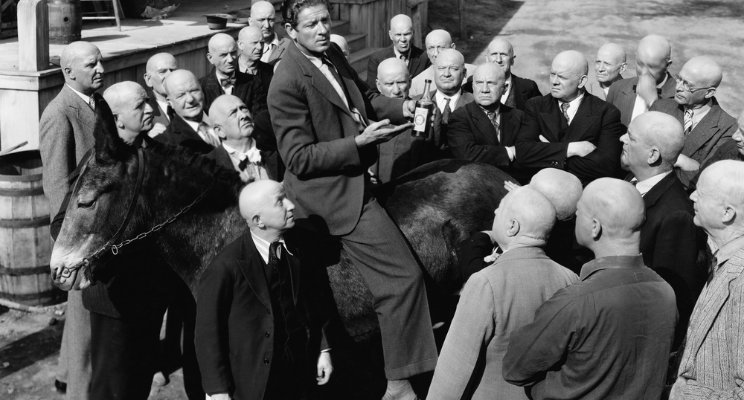“Wise men speak because they have something to say;
fools because they have to say something.”
– Plato
I interviewed a customer recently, as part of a workshop I was running for a client in the technology industry. One topic they asked me to talk about was harnessing the ‘Voice of the Customer’ and getting inside the head of a C-suite executive. This particular sales strategy topic is very close to my heart, so close that I’ve spent the past 6 years building a business focused on extracting actionable customer insights. This article will reveal the most successful strategies.
Greg* was an open book, answering every question I put to him in an honest, thoughtful and often humorous way. Questions like:
- Could you share your observations about the evolution in the IT industry during the course of your career?
- What’s your perspective on the changing needs of customer’s buying technology solutions today vs 10 years ago?
- Can you share some stories about the good, the bad and the ugly of engaging with IT vendors over the course of your career?
- What advice do you have for young salespeople just starting out, who want to add value and be relevant to the customers they serve?
At the conclusion of our interview Greg was gracious enough to stick around a while longer and take questions from the floor. A couple of the responses he gave really struck a chord with me. When one of the audience asked Greg how a young salesperson could engage with or add value to him, Greg explained that he never picks up his desk phone, rarely responded to unsolicited emails, but always responds to an introduction made by some within his peer network.
Find someone to introduce you
As tools like LinkedIn and Facebook continue to highlight, the power of our networks is extraordinary and often underutilised. Overtime, your network should become the most valuable asset in your sales arsenal … assuming you know how to extract value from it of course.
One of the world’s leading authorities on the power of networks is an incredibly interesting and gifted communicator called Kingsley Aikins, who I had the pleasure of meeting in Sydney late last year. Kingsley gives a fascinating TedX Talk exploring the power of building personal networks and leveraging a diaspora, both locally and globally. A couple of his tips that really stood out for me included:
- Build lots of weak connections
- Develop plenty of social capital
- Take the time to audit your network
- Be high-tech and high-touch
- Talk to strangers.
For younger sales professionals or those transitioning from one career path to another, building a strong network can seem an impossible task, but believe me it isn’t. Here’s a few tips of mine, to add to Kingsley’s list:
- Focus on creating a small number of strong connections first and then leverage those to begin building a larger number of weak connections.
- Give freely of your knowledge and insights and always have the heart of a teacher.
- Be authentic and open in your communications, this will prompt others to communicate the same way with you.
- Share valuable content with your peer group as often as you can. The more relevant and personalised the better.
- I’ll start you off, any young salesperson reading this article is welcome to reach out and connect with me and see who I’m connected to. But please don’t send a bland LinkedIn connection request or email.
- Take the extra 30 seconds to write a real note to introduce yourself.
Don’t be intimidated
Selling to the C-suite typically makes salespeople uncomfortable because of the stigma of these senior executives being unreachable or intimidating. Another interesting insight from this workshop was just how intimidated many of the group felt, contacting someone senior in a customer or prospect. So much time and effort is spent working out how to get these meetings, while not enough time is spent focusing on having an impactful conversation and earning the right to progress the discussion.
The good news, as Greg was quick to remind us, is that senior executives were also starting out in their careers once and they aren’t necessarily as unreachable as you might think. As he explained, it’s his job to make the company more profitable and help it run more smoothly. So if you’re able to pose an interesting or innovative way to do that, any senior executive worth their salt will take the time to listen. The bad news as we all know is that most C-suite execs are exceptionally busy people, so your window of opportunity is likely to be small.
Master the art of listening
My advice for selling to the C-suite is exactly the same as my advice for selling to anyone else: Listen. A CEO will listen to you because she’s hoping you can solve a problem for her or present her with some new information. Take the time to really understand what the problem is, talk to the CEO in the language she uses in her business and show her through your words and actions, that you understand. Then and only then, can you even consider proposing a solution or offering an insight.
Takeaway: Let listening become your bedrock sales skill and you’ll build a successful career.
But also … Honor their time
“Wise men speak because they have something to say;
fools because they have to say something.”
– Plato
Whether Plato actually said this or not, it’s perfectly applicable to sales, particularly when you’re dealing with very busy CEO’s who see a lot of vendors.
- Do your research and prepare well
- Be clear in your own mind what you’re hoping to achieve with each interaction (and ‘making the sale’ should not be your only goal)
- Be succinct
- Be aware of your time constraints and structure your content accordingly
- Most of all be yourself.
Takeaway: In sales and in life, time is our most precious commodity, use it wisely and guard it closely.
Make a strong connection with the gatekeeper
My advice is to never to try and trick or circumvent the executive assistant to gain access to a senior leader. Why? Because the executive has charged this individual with guarding their precious time. In the unlikely event you do manage to bypass the executive assistant, the CEO is likely to reprimand them for not doing their job properly and you’ve just made an enemy for life. The best strategy is to actually create a relationship with the gatekeeper.
When I wanted to interview the CEO of a large multinational for a business book I was writing, I started by ringing his EA and asking her about his availability, his preferred method of interacting with interviewers and whether I could send her some information. I didn’t make any demands on her during that introductory phone call and she wasn’t put in the position of having to say yes or no to a meeting request. But a couple of days later, she took the initiative and contacted me to suggest a couple of dates when the CEO would have some time free to meet with me.
Takeaway: Gatekeepers serve an important purpose, respect them, don’t try to circumvent them.
Always be honest
The Hollywood stereotype of a salesperson is a slick, smooth-talking, snake oil salesman. In real life, that’s called being a con-man and thankfully the world of B2B selling is slowly but surely ridding itself of these type of characters.
Many salespeople feel the need to stretch the truth or avoid saying no to a prospective customer, either due to insecurity in their own knowledge or from fear that the prospect will walk away. A far better strategy is to highlight any potential risks, difficulties or stumbling blocks early on in your interactions. Not only will this serve to address concerns that may arise further down the track, but it will also inspire trust and confidence in you, which is a critical quality for closing sales. If they walk away, then you have done both them and you a favour, because they never would have bought in the end.
If a prospective customer wants something you can’t deliver, be up front about it, while letting them know what you can deliver instead. CEO’s know when something sounds too good to be true. If you don’t make it necessary for them to separate fact from needless optimism, they will respect you for it.
Takeaway: Integrity and trust are hard won, but easily relinquished. Guard them with all your might.
A solid strategy is a simple strategy
These tips may sound basic, but that’s OK. Despite what some sales experts might like you to believe, selling isn’t rocket science, it’s been happening in a variety of guises for thousands of years. Sure the tools, techniques and terminology may have shifted a little (although less than you might think) but in this author’s opinion at least, the fundamentals are still exactly the same.
* Greg’s name was changed for this article, but the feedback is his own.



Recent Comments